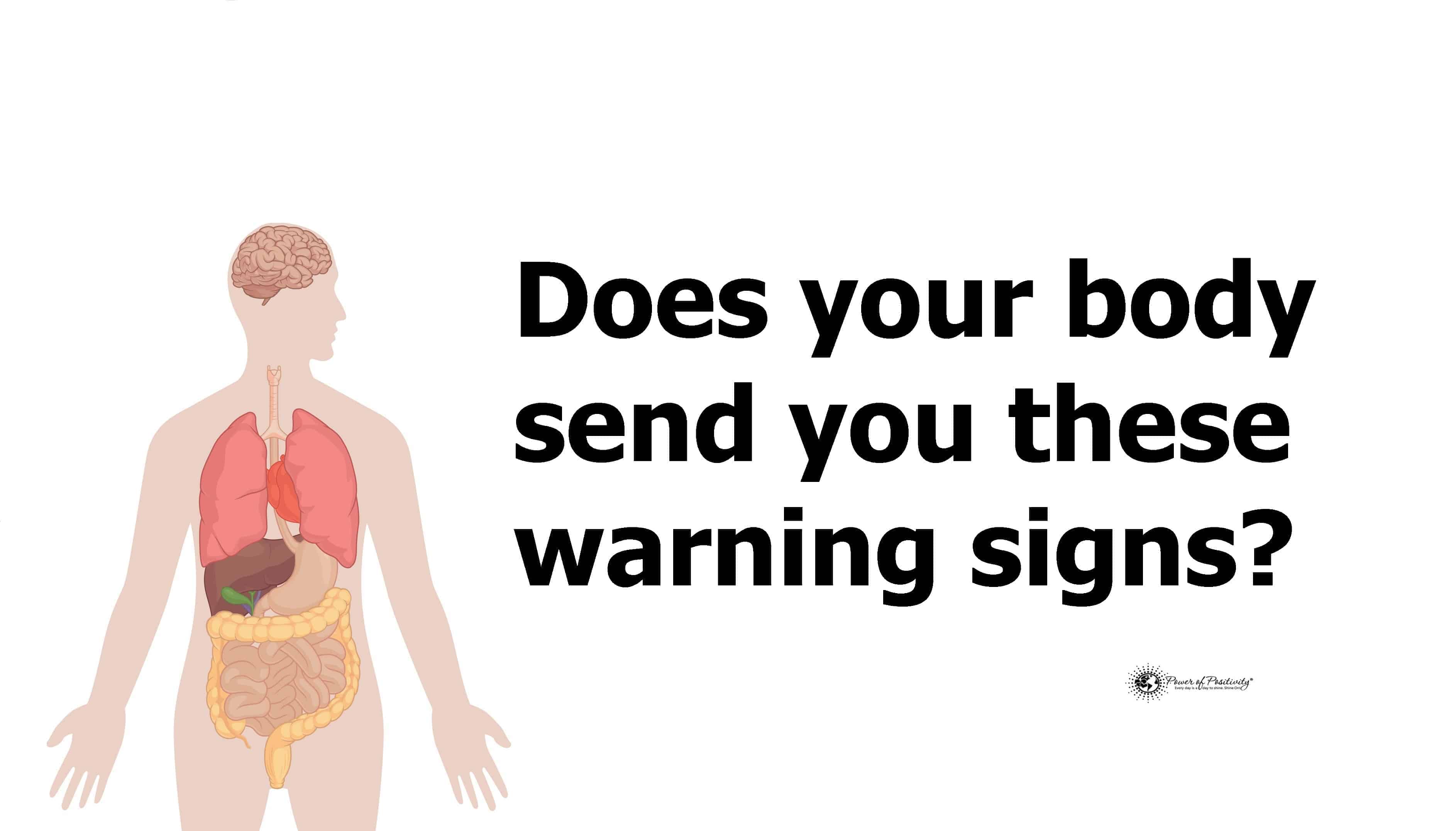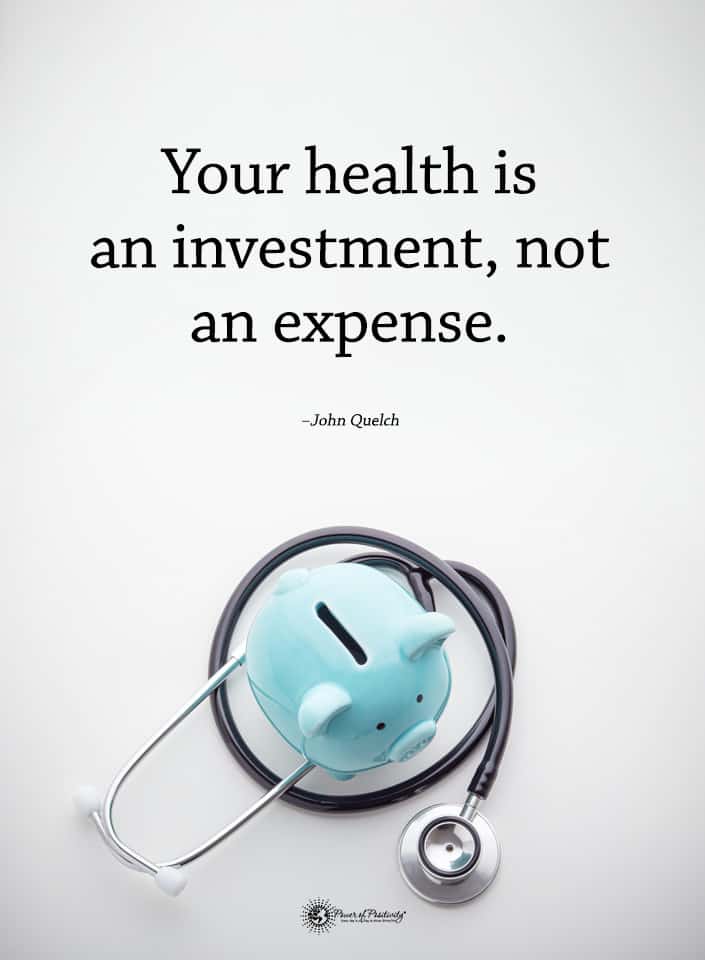The human body is innately intelligent. It can detect, correct and adjust to stimuli in the animal kingdom. The human body and brain are also meticulously connected, which allows the various areas of the body to signal when something, no matter how big or small, is awry.
Many symptoms are often indicative of a root problem. Sometimes, the root problem is something insignificant. At other times not so. However, as human beings, we possess the capacity to evaluate signals that our brain and body have become tuned to.
Here are ten health warning signs your body may be trying to send you:
Do you see these signs in your body? These symptoms can explain so much!
1. Constipation: You’re not getting adequate fiber
Constipation is one predominant, obvious symptom of low fiber intake. According to Dr. Mark Hyman, “Our hunter-gatherer ancestors ate up to 100 grams of fiber a day and had an average stool weight of 2 pounds.” Now, fast-forward to today, where the average American eats less than 8 grams of fiber…quite a significant difference. Difficulty in passing or hardness in stool texture can also signify low fiber intake.
Other signs of inadequate fiber intake: include frequent hunger, digestive problems, unhealthy skin, inflammation, low energy, and lethargy.
2. Gas and bloating: You’re eating food that you cannot tolerate
Similar to how we react when we see intolerable behavior – with disdain, disgust, etc. – our bodies act similarly when eating unbearable food. Some people can’t eat certain foods without an unwelcome reaction.
Infrequent gas and bloating are normal byproducts of digestion. However, when we are constantly fighting gas and bloating, it usually means we’re eating a particular food that our body does not agree with.
Other signs of food intolerance: Sinus congestion, eczema (dry skin), brain fog
3. Cracking at corners of the mouth: You’re deficient in B-vitamins
Various studies reveal that when cracks or sores appear at the mouth’s corner, it could signify vitamin B deficiency. Dr. Hass, a prominent physician in California, says: “Deficiencies of one or more B vitamins may occur fairly easily, especially with diets that include substantial amounts of refined and processed food, sugar or alcohol.”
Other signs of vitamin B deficiency: fatigue, skin problems, dark circles under the eyes, anemia
4. Sudden fatigue: You’re drinking too much caffeine
Caffeine is an effective energy boost in the very short term. It is necessary to seek natural solutions for sustained energy, such as other sleep and relaxation and good dietary habits. This is not to say that a cup of Joe in the morning isn’t okay. It is. However, caffeine is only good (and practical) in moderation. Too much caffeine over the long term is counterproductive, health-wise.
Other signs of caffeine abuse: agitation, irregular heartbeat, jitters, heartburn, frequent urination
5. Frequent colds: Your gut lacks good bacteria
Strange as it sounds, the immune system inextricably links to the gut. More specifically, our gut is the dwelling place for many good bacteria. This bacterium aids the immune system by providing an additional defense mechanism against illness.
Other signals of gut imbalance: gas, bloating, constipation, urinary tract infection, yeast infection, unhealthy skin, athlete’s foot
6. Indigestion: Your stomach acid is low
Stomach acid plays a vital role in the digestion of food. At low levels, the digestive process is much less efficient. Also, food remains stationary in the stomach for more extended periods, as does the swallowed air. Frequently, this air moves up the esophagus and expels through the mouth in the form of gas or a burp.
Other signs of indigestion: gas, weakened immune system, chronic infections, cracked fingernails
7. Chapped lips: You’re dehydrated
When we’re not appropriately hydrated, our skin naturally receives less moisture. Less moisture available to the skin means dryness and flaking. Our lips, in particular, require sufficient moisture to remain healthy. When lips don’t have moisture, they become chapped.
Other signs of dehydration: craving sweet or salty foods, fatigue, inability to focus or concentrate, irritability
8. Headaches: You’re drinking too much soda
The substance aspartame is a near-universal presence in diet sodas, where diet soda derives its sweetness. Certain animal studies also revealed aspartame’s neurotoxic effects in animals, which is concerning to health professionals. In human studies, aspartame – along with some other artificial sweeteners – has been shown to produce headaches and even migraines.
Other signs of too much soda: include craving sweet or salty foods, irritability, and inability to focus
9. Itchy ears and throat: You have a candida overgrowth
Candida albicans is a fungus that resides in the gut. Under normal conditions, the presence of this fungus is nothing unordinary, but imbalances in the gut can cause this fungus to colonize and spread. When it applies, it often ends up irritating and inflaming the skin.
Other sides of candida overgrowth: fatigue, weak immune system, weight gain, yeast infections, mood swings
10. Constant coughing: post-bronchitis syndrome
After a particularly long bout with a cold, sometimes a long period of coughing follows. The symptoms of post-bronchitis syndrome mirror those of asthma but naturally reside within a few months. Medical professionals recommend seeing a physician, who may find it necessary to prescribe an inhaler or an alternate form of treatment.
Other sides of post-bronchitis syndrome: wheezing, shortness of breath, sore throat
15 Best Habits To Support Good Health
1. Healthy eating habits.
Besides eating nutritious foods, it’s important to follow healthy eating practices to support your good health. Here are some beneficial eating practices to implement in your daily life.
- Eat smaller-sized food portions-Food portions in the United States are enormous. No matter how healthy food is, when you eat a large amount of it, you add calories to your diet. Train yourself to eat less. Cut down on how much you eat at every meal. It may be difficult at first, but your stomach will adapt to the smaller portions over time.
- Don’t eliminate entire food groups-Many trendy diets eliminate entire food groups. Unless you have a food allergy to certain foods, this isn’t sound advice. When you stop eating a whole food group, you miss out on significant vitamins and minerals your body needs. The adverse effects of omitting a food group may not show up until later in life. Skipping entire food groups lead to specific health problems, including:
-
- Brain problems-Lack of particular vitamins is essential for good brain health.
- Osteoporosis-Brittle bones occur from a lack of dairy products.
- Heart problems-Stress occurs in your heart muscle from a lack of specific vitamins and minerals.
- Muscle loss-A lack of proper nutrients leads to weakness in your muscles
- Infertility-Improper nutrition prevents you from getting pregnant.
- Higher death rate-People who miss out on specific vitamins and minerals are prone to an earlier death.
- Eating disorders-Limiting foods can lead to eating problems, yo-yo dieting, and body image issues.
- Drink water-Avoid drinking sugary drinks like energy drinks or flavored waters that contain artificial sweeteners. Instead, drink plain water. The general rule is to consume 4 to 6 cups (1.42 l) of water every day to stay completely hydrated.
2. Lose weight.
Carrying around extra is harmful to your body. It puts you at risk of experiencing health problems, such as
- Stroke
- Sleep apnea
- Breathing problems
- Osteoporosis
- Heart disease
- High blood pressure
- Type 2 diabetes
- Gallbladder disease
- Mental health problems
- Certain types of cancer
- Aches and pains in your joints
- Pregnancy complications
If you realize you’ve put on some extra weight, try to lose it right away. The more weight you need to lose, the harder it is to lose. Don’t feel you need to change everything at once. Start with small steps like eating fresh, non-processed foods instead of processed ones. Grab veggies or plain popcorn for a snack instead of chips. Limit your red meat and sugar. Following these simple steps will help you drop the extra weight safely and slowly, so you’ll keep it off longer.
3. Exercise
Try to get some exercise daily. You don’t need to join a gym. Just keep moving.
- Walk-A 30-minute brisk walk will burn 150 calories. You can break the time up into 15 intervals.
- Ride your bike-A stationary bike, or an outdoor bike is a fun way to get your daily exercise.
- Clean your house-If you are hiring someone to clean your house. You’re missing out on some simple exercise.
- Garden-Digging, planting, and pulling weeds burn calories.
- Dancing-Take a dancing class or stream your favorite songs and dance around your house.
- Yoga-You can practice yoga at home or in a class. The stretches and poses are surprisingly strenuous.
4. Wear sunscreen and protective clothing
Skin cancer is one of the most common types of cancer in the United States. Limiting how long you’re out in the sun and always wear sunscreen whenever possible. Wear a hat and long sleeve shirts to protect your skin. Pick a sunscreen that has at least an SPF 15 or more. BE sure to reapply the sunscreen at least every couple of hours. Avoid tanning beds, sunbeds, tanning lamps, and laying out in the sun.
5. Vitamin D
Another way to support good health is to consume enough vitamin D. This critical vitamin maintains your bone strength, reduces depression, lowers your cancer risk, and boosts your immune system. You get some vitamin D from the sunshine, but you might consider taking a vitamin D supplement to meet your required level. Check with your doctor if you’re not sure how much vitamin D supplement you should take every day.
6. Limit your alcohol
Cut back on your alcohol consumption. Begin by doing these things in small steps, such as
- Limit yourself to only ten drinks a week
- Have an alcohol-free week or month once in a while
- Swap out alcohol for other alternatives
- Drink lots of water
- Always eat before you drink
- Find healthy ways to relax besides drinking alcohol, such as yoga, prayer, walking, or meditation.
7. Enough sleep
When you get a proper amount of sleep, you have fewer mental health problems. Sleep boosts your mind and body. It increases your learning ability, protects your heart, improves your decision-making, and prevents weight gain. Follow these tips to improve your sleep every night.
- Don’t eat or drink alcohol too close to your bedtime
- Stay off your computer and smartphone, and don’t watch your television late at night. This interacts with your ability to fall asleep and stay asleep.
- Go to bed at the same time. This routine helps your body wind down at night.
- Be sure you’re getting enough calcium and magnesium. You can take a calcium, magnesium, and zinc supplement before bed to help you sleep.
8. Have safe sex
According to recent studies, sexually transmitted diseases (STDs) are increasing in the United States. The safest form of sex is between 2 people who only have sex with each other. Always use protection when having sex to prevent STDs. Condoms are the best form of prevention of sexually transmitted diseases.
9. Read
Reading It’s a great way to enhance your health. It strengthens your mind and lowers your blood pressure and heart rate. When you take time to read, you’ll reduce your stress and improve your mental health. It’s thought that reading fiction is the most effective stress reducer. When you read, it relaxes your muscles and increases your ability to concentrate. Reading causes your breathing and heart rate to slow down as if you were meditating.
10. Take time to be creative
Creativity improves your mental health. Creative activities stimulate your mind, lower your stress and improve your ability to problem solver. Those who practice creativity have a greater sense of well-being, have more energy and feel happier. Whether you sign up for a painting class or find a creative solution for your kitchen’s organization issue, you’ll boost your health by being creative.
11. Get some time outside in nature
When you go out, you’re exposed to fresh air and sunshine, making you feel happier and less stressed. Being outside releases serotonin, a natural mood-stabilizing chemical. It’s a healthy escape to recharge your brain and get energized. Try getting outside doing an activity such as
- Going for a walk
- Gardening
- Swimming
- Having a picnic
- Birdwatch
- Taking a bike ride
12. Show gratitude
Showing gratitude helps you to let go of negativity and stress. When you’re thankful to the people around you, you’ll be surprised at how your outlook on life improves. You may find it helpful to journal your feelings of gratitude. Later, you can read what you wrote in your journal to remind yourself of all the good things in your life.
13. Get a pet
Owning a dog or cat gives you a sense of purpose and reduces stress. You’ll get more exercise because your dog needs to go for daily walks. You also have a better understanding of security and feel less lonely. Pets boost your sense of self-confidence and provide opportunities to meet new people in your neighborhood. Consider adopting a dog or cat from your local shelter. You’ll not only provide a home for a sweet animal but boost your health.
14. Regular check-ups
Getting regular health check-ups helps find potential health problems before they become a big problem. Getting early treatment may avoid complications later on. During your check-up, your doctor will write down your current health history, give you a physical exam, and order blood tests.
15. Don’t smoke
Smoking leads to health problems, such as:
- Lung disease
- Diabetes
- Stroke
- Pulmonary disease
- Chronic bronchitis
It also puts you at risk for eye diseases and a weakened immune system. Even smoking marijuana can be harmful. There is concern that long-term use of marijuana causes cognitive dysfunction and respiratory problems.
Final Thoughts On Listening To Your Body’s Warnings About Your Health
It’s never a good idea to ignore your body’s warnings. If you are experiencing weird symptoms, don’t assume it’s nothing. There are many stories of people who felt like something was wrong, but they ignored it. Only later found whether they found they had a severe medical problem. You know your body better than anybody else. So, if you sense something is wrong, you’re probably correct. Even if it’s a small thing, don’t hesitate to get a check-up right away.

















